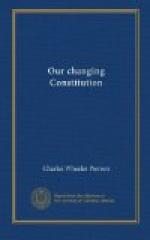As already said, the Commerce Clause has been found most available for purposes of such legislation. Other clauses have, however, served their turn. For example, the grant of power to lay taxes was utilized to destroy an extensive industry obnoxious to the dairy interests—the manufacture of oleomargarine artificially colored to look like butter.[1] Also to invade the police power of the States in respect of the regulation of the sale and use of narcotic drugs.[2] Also to check speculation and extortion in the sale of theatre tickets![3] The power to borrow money and create fiscal agencies was utilized to facilitate the making of loans upon farm security at low rates of interest through the incorporation of Federal land banks or Joint Stock land banks.[4]
[Footnote 1: McCray v. United States, 195 U.S., 27.]
[Footnote 2: Narcotic Drug Act. Held constitutional in United States v. Doremus, 249 U.S., 86; Webb v. United States, 249 U.S., 96.]
[Footnote 3: Revenue Act of 1921, Title VIII, subdivisions 2 and 3.]
[Footnote 4: Smith v. Kansas City Title Co., 255 U.S., 180.]
It would be an insult to intelligence to claim that legislation such as this, wearing the form of revenue measure or regulation of commerce but in reality enacted with a different motive, does not involve an enormous extension of the national power beyond what the makers of the Constitution supposed they were conferring or intended to confer. What, then, of the declaration by the Supreme Court with which we began, that “to determine the extent of the grants of power we must place ourselves in the position of the men who framed and adopted the Constitution, and inquire what they must have understood to be the meaning and scope of these grants.” The answer must be that the Court itself has not always adhered strictly to this test. The Court has taken the position that when power exists under the Constitution to legislate upon a given subject—say interstate commerce or taxation—it is not for the judiciary to seek to correct abuses by Congress of that power, or to question Congressional motives. As said in the decision sustaining the constitutionality of the oleomargarine law:[1]
The judiciary is without authority to avoid an act of Congress lawfully exerting the taxing power, even in a case where to the judicial mind it seems that Congress had, in putting such power in motion, abused its lawful authority by levying a tax which was unwise or oppressive, or the result of the enforcement of which might be to indirectly affect subjects not within the powers delegated to Congress, nor can the judiciary inquire into the motive or purpose of Congress in adopting a statute levying an excise tax within its constitutional power.
[Footnote 1: McCray v. United States, 195 U.S., 27.]




